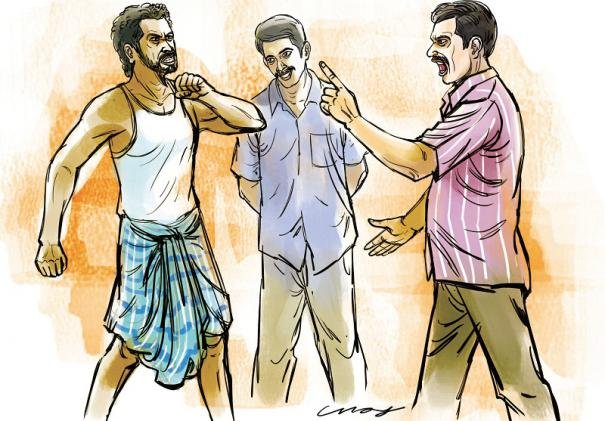Note -about conducting debate
‘If you can’t stand the heat, get out of the kitchen.’ That’s basic advice but it seems we need to proffer it to those who seem unable to resist attacking, or falsely accusing or criticising others. When their medicine is returned to them, they scream aloud and run around. Happily the world of struggle politics is not plagued by these types – I am talking specifically about a FEW Tamil youth.
Among Tamils, a university education has always ranked high in the social order of things. Education is vital but there are many ways of getting it. But once you become a doctor or an engineer, or something of that sort, society treats you as one possessing the wisdom of all knowledge! This backwardness is reflected in some youth who seem to think that a few years in a university, or reading a few books guarantees them the ‘authority’ to look down on others. And that whatever they say is the ‘finished product’. Let’s take the case of Sinthujan.
Sinthujan may have many very positive qualities, but he recently attacked a group of youth activists. We all have to take up issues and criticise others at time – that’s politics. But in this instance it was on an incorrect basis. When this mistake was pointed out to Sinthujan in a few paragraphs, he lashed out with rants and screams which included misinterpretation, misunderstanding of concepts and false accusations. Then he declared that he will not read any response to that!
But a response was written which dealt with the political separately from the personal. But Sinthujan completely ignored all the points made. He did not apologise for his mistakes – some are not even theoretical, merely outright misinterpretations. He didn’t have the ‘intellectual integrity’ to respond or defend his arguments. Instead Sinthujan went on with his rant about something that he himself imagined. But most notable is the way that he wrote it.
While responding to me, he avoided using my name, but attacked me anyway. This is behaviour is very commonly found among people of ‘authority’ – oppressive class and caste. Bourgeois newspapers often attack Marxism and Marxist – but will almost never mention the left by name. They can’t afford to give the oxygen of publicity! The same goes for the way the rabid RSS write stuff. This is not the way socialists conduct themselves.
Despite having significant strength in society among the working class, among all sections of oppressed people, socialists don’t use their authority to supress but to the advance the interests of the masses. Repeatedly attacking someone without referencing their name is not just childish – it also exhibits authoritarian behaviour. This is precisely why he invited responses from others without mentioning names.
While taking comfort in being defended by a practicing Hindu, and simultaneously being proud to be associated with the ‘race industry’, and also raising illusions in the institutions like the UN and lobbying them to save Tamils, and at the same time actively seeking allies in confused ‘liberal’ organisations, while also admiring the crude arguments of some rudimentary intellectuals and all sorts of social liberals, Sinthujan decided to look down on the left! He could not even understand the basic complexity.
He first claimed that “Tamil culture is caste culture”. When we said that “definition” is not correct, he gave a little lecture about why culture is not this or that. Then He expected us to come out with some sort of definition! Ignoring all the points about why we said the above statement is wrong he goes on with another assumption that we said the “initial claim was never made to begin with”! And as usual he throws in some free advice on how to understand caste –“just raise the ‘right’ questions in diaspora and you’ll be just fine” he says. It’s not arrogance that bothers us, but the ignorance associated with it.
Is it too complicated to understand?
“‘Tamil culture’ in general represents a certain historical evolution of a group with various features. Tamil culture is diverse, as is any other ‘culture’ on the planet. Culture generally reflects the social relations of a particular period which in turn are closely linked to the mode of production that dominate in that particular era. This means culture – or features of culture – is constantly changing and is dominated by those in control of the means of production.
Culture doesn’t exist in blocks – purified clear divisions don’t exist. This is why when we say English culture, we don’t simply point to Tory culture. What an insult that would be to the English working class…”
Most importantly there is no response to any of our political points including our question about the proposed anti-caste legislation in Britain.
This is developing as a sharp exchange. Sometimes that is necessary. It is not for ourselves or personal benefit that we take up these issues but in pursuit of clarity and useful outcomes. By ‘useful’ we mean useful to the masses, not to us as individuals. But we don’t write anyone off. Far from it. If people are willing to genuinely grapple with what are extremely complicated questions and to seriously commit to the struggle to find ways of fighting back against oppression then we will be there, ready and waiting to engage. Selven Vu Sivaram Taraki Karthick RMS



















